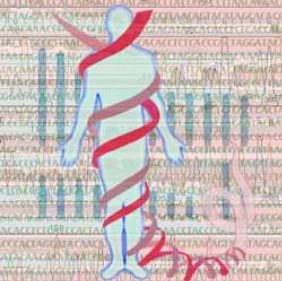Concept 39 A genome is an entire set of genes.

Each organism has a defining set of chromosomes that contain all of its genetic information. The human genome, for example, is the set of genetic information encoded in 46 chromosomes found in the nucleus of each cell. The chromosomes are organized into 23 pairs — one chromosome of each pair is inherited from the mother and one from the father. One pair of chromosomes — X and Y — determine sex; the other 22 pairs are called autosomes.
So, the human genome is made up of a set of very long DNA molecules, one corresponding to each chromosome. Arrayed along these molecules are an estimated 35,000 genes. The object of the Human Genome Project is to determine the entire nucleotide sequence of each of these DNA molecules — and the location and identity of all the genes. Sequencing the human genome has relied mainly on automated machines that sequence the DNA and computer programs that search and identify genes. A "working draft" DNA sequence of the human genome was completed in June 2000. Initial analyses of this working draft were published in February 2001.
 DNA is packaged in a chromosome.
DNA is packaged in a chromosome. Higher cells incorporate an ancient chromosome.
Higher cells incorporate an ancient chromosome. Some DNA does not encode protein.
Some DNA does not encode protein. Some DNA can jump.
Some DNA can jump. Genes can be turned on and off.
Genes can be turned on and off. Genes can be moved between species.
Genes can be moved between species. DNA responds to signals from outside the cell.
DNA responds to signals from outside the cell. Different genes are active in different kinds of cells.
Different genes are active in different kinds of cells. Master genes control basic body plans.
Master genes control basic body plans. Development balances cell growth and death.
Development balances cell growth and death. A genome is an entire set of genes.
A genome is an entire set of genes. Living things share common genes.
Living things share common genes. DNA is only the beginning for understanding the human genome.
DNA is only the beginning for understanding the human genome.